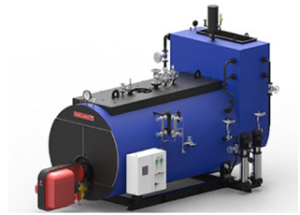Industrial boilers are used to produce steam or heat water for space and process heating and the generation of mechanical power and electricity. The primary boiler fuels are coal, oil, and gas. Oil and gas involve the simplest controls since they can be measured easily, and flow is regulated by a control valve in the fuel line.
The working principle of an industrial boiler is based on the principle of energy conversion. It provides thermal energy using fuels (e.g. coal, oil, natural gas, biomass, etc.) to heat the medium to a high temperature and pressure state to produce steam or hot water. The steam or hot water is transported through pipes to the equipment that needs heat energy, achieving the transfer and use of energy.
- Industrial boilers are widely used in electric power, petrochemical, food processing, pharmaceutical, textile, printing, and dyeing industries.
- In power plants, industrial boilers generate high-temperature, high-pressure steam to drive turbines to generate electricity.
- In petrochemical and chemical plants, industrial boilers provide heating and thermal energy to drive various reactions and processing operations.
- In food processing plants, industrial boilers are used for baking, sterilising, boiling and other processes.
- In pharmaceutical plants, they provide clean steam to meet the requirements of pharmaceutical processes.
- textile and dyeing industries, industrial boilers provide hot water or steam for dyeing, printing, drying and other processes.
The most common types of boilers in the industrial sector are;
Industrial steam boilers:
Steam generators use a heat exchanger to heat water and convey it to a piping system connected to radiators. The operating mechanism uses pressure and gravity to deliver hot steam to the radiators and return the condensed steam to water in the boiler, where it is reheated.
Industrial water-fired boilers:
Industrial hot-water boilers rely on the temperature, volume, and pressure of water, which is distributed into the network by pumps. As the water is heated to the desired temperature, as it expands, it increases its volume until it reaches the radiators, which radiate heat into the room. The cooled water returns to the boiler by gravity or through a circulation pump to be reheated.
Industrial diathermic oil boilers:
Diathermic oil (thermally conductive fluid) boilers act as a substitute for water in boilers, and their unquestionable advantage is the lack of corrosion and scaling. Diathermic oil, which does not evaporate, does not subject the system to excessive pressure. In addition, the gas or crude oil needed for combustion is heated by the thermal oil, which, compared with steam boilers, minimizes the risk of explosion.

